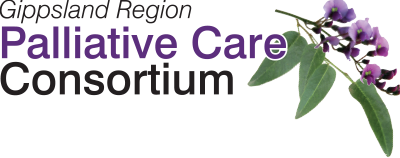
Health Professionals
The term ‘health professional’ covers a range of disciplines and includes doctors, nurses, allied health professional, and pharmacists. Health professionals provide services to people at different stages in their life including at end of life. They provide palliative care with the aim of improving the quality of life for the client and their carers.
The GRPCC is committed to providing workforce development to health professionals to enable quality palliative care services in the Gippsland region. This is achieved through education, practical resources and engagement in various palliative care and end of life care projects.
If you would like more information about what services the GRPCC could assist you with please contact us.
Information for Health Professionals
-
These guidelines have been developed by the Gippsland Region Clinical Practice Group to assist health professionals and palliative care service providers develop their own policies and procedures around palliative care.
Click here for Clinical Practise Group Guidelines.
-
Therapeutic communication is critical to identify patients’ goals of care, particularly in the cancer and palliative care setting. The process of communication is central to effective, safe, patient-centred and compassionate care. Effective communication has the potential to improve quality of life, access to key services, and relationships between patients, families, and clinicians.
Click here for Communication Skills resources.
-
Professional development in palliative care is a key factor in ensuring health professionals provide quality palliative and end of life care. The GRPCC aims to provide health professionals with essential education and training to enable better care provision to people who require palliative and end of life care.
Click here to find out more about Educational opportunities.
-
Click here for End of Life Care resources.
-
Clinicians who work continuously or intermittently with patients who are approaching death, and their families, may experience their work as rewarding and/or demanding, both professionally and personally. (Palliative Care Expert Group, 2016). The emotional nature of palliative care work can also be influenced by the realities of increasing workloads, the potential scarcity of resources for those with life-limiting illnesses.
Click here for Health & Wellbeing resources.
-
Advance care planning is the process of planning for future health care. It encompasses decision making around care that a person does and does not want to receive when they are no longer able to communicate their preferences or make decisions related to their health care. It also relates to care at end of life.
Click here for Planning Care resources.
-
These are groups that may be vulnerable and have increased susceptibility to adverse health outcomes resulting from not yet having equal access, or not accessing high-quality health care when and where they need it.
Click here for Priority Population resources.
-
Click here for Symptom Management resources.
